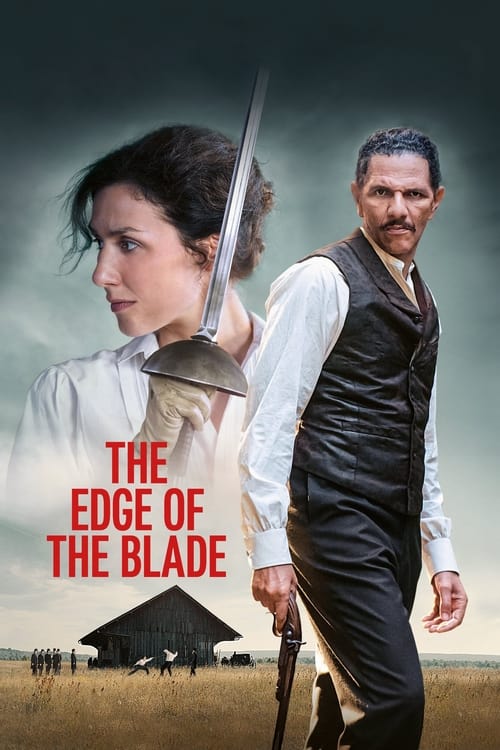The Edge of the Blade

Plot
The Edge of the Blade, directed by Sylvain Goldberg, is a thought-provoking French drama that delves into the world of dueling and the societal pressures of 19th-century Paris. Set in 1887, the film centers around Clément Lacaze, a charismatic and skilled swordsman, and Marie-Rose Astié, a fiercely independent and determined feminist, who find themselves entangled in a web of violence and honor. Clément, a master of arms, is well-versed in the art of dueling, which has become a popular pastime among the Parisian elite. His experiences with dueling have led him to develop a certain detachment, a way of coping with the consequences of violence. In contrast, Marie-Rose, a trailblazing woman of her time, is passionate about creating change and challenging the status quo. Her presence in Clément's life serves as a catalyst for introspection and reevaluation. Their meeting, though seemingly innocent, sets off a chain of events that will test the boundaries of their relationship. A duel goes awry, and Clément finds himself caught in a cycle of violence and retribution. In an attempt to protect himself and salvage what's left of his reputation, Clément takes it upon himself to introduce Marie-Rose to the world of dueling. At first, Marie-Rose is hesitant, but eventually, she surrenders to the allure of the art, which she sees as a means to empower herself and challenge the societal norms. As they begin their training, Clément and Marie-Rose develop a strong bond, rooted in a shared sense of curiosity and determination. Their relationship evolves from advisor and pupil to something more complex, as they grapple with the consequences of their actions. Marie-Rose becomes increasingly entrenched in the world of dueling, seeing it as an opportunity to confront the male-dominated society head-on. Clément, however, starts to question the harm caused by the dueling culture and the rigid social codes that govern their lives. Throughout the film, Clément and Marie-Rose find themselves caught in a precarious dance of honor and reputation. They face numerous challenges, from the criticism and disapproval of those around them to the very real dangers of dueling. Each duel leaves them with physical and emotional scars, making it difficult for them to distinguish between the thrill of victory and the risk of injury. The Edge of the Blade raises questions about the true cost of defending one's honor and the consequences of living by a strict code of conduct. The film challenges the audience to think about the role that societal expectations play in shaping our actions, and whether the preservation of reputation and social standing is worth the price of our humanity. As the story unfolds, Clément and Marie-Rose come to realize that their pursuit of honor and recognition may lead them down a path from which there's no return. They must confront the choices they've made and decide whether the allure of dueling and the adoration of their peers is worth the price of their individuality and the cost of their relationship. In the end, The Edge of the Blade presents a nuanced exploration of a bygone era, shining a light on the intricacies of the dueling culture and the complex lives of its characters. Through Clément and Marie-Rose's experiences, the film suggests that true strength lies not in physical prowess or societal standing but in embracing change, challenging the status quo, and standing up for what is right.
Reviews
Kayden
Okay, please provide the review text you would like me to translate into English. I'm ready when you are.
Owen
The subject matter shows promise, but its exploration of themes like honor and dignity, feminist ideals, post-war recovery, class divisions, and the ambiguous area between law and tradition feels superficial and rushed. The romantic subplot between the male and female leads is largely superfluous.
Annie
"La Halte: A moment of respite, a breath held before the clash. 'Cuirasser': To be armored, protected, yet exposed. 'Le Duel, Le Duelliste': The duel itself, the dance with death, and the one who dares to waltz. 'Épée, Pistolet, Sabre': Steel, gunpowder, and the curve of fate, each a path to destiny. The most shocking revelation came with the end credits: It wasn't until 2013 that women were officially authorized to wear trousers. A stark reminder of the societal constraints against which these duels of honor and defiance were fought."
Kenneth
Vincent Perez was definitely a heartthrob in his younger days! His films with Sophie Marceau are also quite memorable. However, time spares no one. He has indeed aged and become a bit greasy. This film is quite realistic. The writers, directors, and actors have also worked hard to portray and recreate the duel culture of 19th-century France. Several duels, including fencing, horseback combat, and shooting matches, were crafted meticulously, making them both suspenseful and exciting!
Sasha
The female lead wielding a sword is undeniably cool, but the story itself is uninspired. And that between the male and female leads? Let's not even call it a romance.
Recommendations




